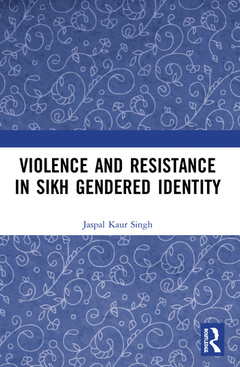Violence and Resistance in Sikh Gendered Identity
Auteur : Kaur Singh Jaspal

This book examines the constructions and representations of male and female Sikhs in Indian and diasporic literature and culture through the consideration of the role of violence as constitutive of Sikh identity. How do Sikh men and women construct empowering identities within the Indian nation-state and in the diaspora? The book explores Indian literature and culture to understand the role of violence and the feminization of baptized and turbaned Sikh men, as well as identity formation of Sikh women who are either virtually erased from narratives, bodily eliminated through honor killings, or constructed and represented as invisible. It looks at the role of violence during critical junctures in Sikh history, including the Mughal rule, the British colonial period, the Partition of India, the 1984 anti-Sikh riots in India, and the terror of 9/11 in the United States. The author analyzes how violence reconstitutes gender roles and sexuality within various cultural and national spaces in India and the diaspora. She also highlights questions related to women?s agency and their negotiation of traumatic memories for empowering identities.
The book will interest scholars, researchers, and students of postcolonial English literature, contemporary Indian literature, Sikh studies, diaspora studies, global studies, gender and sexuality studies, religious studies, history, sociology, media and films studies, cultural studies, popular culture, and South Asian studies.
Introduction 1. Cultural Syncretism vs. Collective Psychic Fragmentation: The Construction of Sikh Gendered Identity 2. Mughal India and Colonialism: Revising History, Gender Identity and Violence in Bhai Veer Singh’s Sundri 3. Communal and Gender Violence in Shauna Singh Baldwin’s What the Body Remembers 4. Gendered Violence and Partition Memory in Postcolonial Novels and Films 5. Partition Narratives and Sikh Gendered Identity Construction: Memory of Violence in Khushwant Singh’s 1956 Novel Train to Pakistan 6. Gender and Memories of Trauma in Amrita Pritam’s 1950 Novella Pinjar and Poems 7. Violence, State Terror, and Gendered Sikh Identity: The Aftermath of Operation Blue Star in Gulzar’s 1996 Hindi film, Maachis (Matches) and Anurag Singh’s 2013 Punjabi Film, Punjab 1984 8. Traumatized Sikh Male and Female Subjects: Representations of Trauma and Memory in Amitoj Mann’s 2003 Punjabi Film Hawayein 9. (En)Gendering Nations in Manoj Punj’s2004 Punjabi Film, Des Hoyaa Prades:When One’s Nation Becomes a Foreign Territory 10. Perpetrator Nation and the Cultural Memorialization of Sikh Trauma in Shonali Bose’s Novel, Amu (2004) 11. Once Again, the Turban: Terror and Gendered Sikh Identity in Liam Delzell’s Punjabi Cab, Satdeep Singh’s Taaj, and Sarab Singh Neelam’s Ocean of Pearls 12. Gendering the Sikh Diaspora and Transnational Feminism: The Construction of Sexuality in the Poems of Sukhjeet Kaur Khalsa (2016), Sharapal Ruprai (2014) and Rupi Kaur (2015 and 2017). Bibliography
Jaspal Kaur Singh is Professor of English Literature at Northern Michigan University, Marquette, Michigan, USA. She received her PhD in Comparative Literature from the University of Oregon. She was a Rockefeller Foundation Fellow at the Institute for the Study of Gender in Africa, James S. Coleman African Studies Center, UCLA and a Fulbright Nehru Senior Scholar in India. Her publications include a monograph, a coauthored book, and three coedited books: Representation and Resistance: South Asian and African Women Writers at Home and in the Diaspora (2008); Narrating the New Nation: South African Indian Writing (2018); Indian Writers: Transnationalisms and Diasporas (2010); Trauma, Resistance, Reconciliation in Post-1994 South African Writing (2010); and Negotiating Gender and Sexuality in Contemporary Turkey (2016).
Date de parution : 02-2022
15.6x23.4 cm
Date de parution : 05-2020
15.6x23.4 cm
Thèmes de Violence and Resistance in Sikh Gendered Identity :
Mots-clés :
Young Man; Sikh Woman; feminism; Waris Shah; globalism; Amritdhari Sikh; Postcolonial literature; Sikh Men; gender; Akal Takht; transnationalism and diasporas; Sikh Community; Sikh literature and culture; Sikh Identity; diaspora; Operation Blue Star; Indian literature and culture; Partition Violence; Indian diaspora literature; Turbaned Sikh; Sikh gendered identity; Young Sikh Woman; gendered violence; Sikh Nation; 1984 anti-Sikh riots; Akali Dal; British's colonialism; Partition Trauma; Female Feticide; Arya Samaj Movement; Granth Sahib; Traumatic Memory Recall; Bharat Mata Ki Jai; Anglo-Sikh Wars; Perpetrator Nation; Namdhari Sikh; Liver Transplant Unit; Sikh Subject
